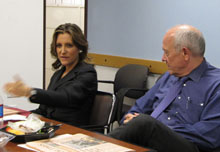
November 10, 2009 — U.S. managing editor of Financial Times, Chrystia Freeland, spoke at the Shorenstein Center brown-bag lunch on “Business and International Coverage for a Paying U.S. Audience.”
Freeland began with a quote from Warren Buffett: “If cable and satellite broadcasting as well as the Internet had come along first, newspapers as we know them probably would never have existed.” She explained that journalism “used to be the easiest business in the world; it’s now a really hard business, and the whole way that we’re structured editorially as well as commercially doesn’t make sense any more.”
In response to the technical revolution that has threatened journalism business models, Freeland suggested that the “editorial concept has been disintermediated, and maybe even revealed.”
Freeland called the news industry the “white-collar equivalent of Detroit auto workers,” as journalists fear job loss, and editors must deal with cutting staff. However, she said that the difficulties surrounding the economic crisis “shouldn’t be the driver and shaper of the solutions that we have, and the shaper of what we think will be the journalism that we can continue to produce in the future.” Instead, she argued that the “end of the oversupply of journalism … might actually be a good thing,” and as fewer news organizations compete, there are greater opportunities and “pricing power” for the ones that remain.
Looking at nonprofits as alternate financial models for news, Freeland said that she is cautious because of “the possible crowding out…of private initiatives, some of which might actually work.”
Keeping a “reader focus,” Freeland said that at Financial Times, there has been a “sharpening of our focus on the business, financial and geo-economic part of the spectrum” in response to the shift in the news market. Despite fears in the journalism industry of “down-market” content with an increasing online audience, Freeland gave examples of Internet ventures, such as Politico, that contribute to “smartening up rather than dumbing down,” adding, “I hope that we are going to become an example of that.”
This article was written by Janell Sims and the photo taken by Leighton Walter Kille, both of the Shorenstein Center.

